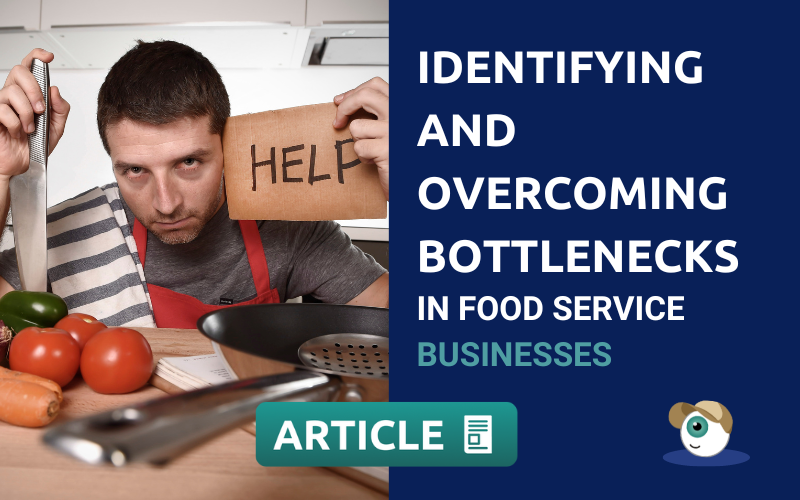Identifying and Overcoming Bottlenecks in Food Service Businesses

In today’s highly competitive foodservice landscape, even minor operational roadblocks can have a ripple effect, impacting everything from customer satisfaction to your bottom line.
Every minute lost due to inefficiencies in foodservice businesses translates to impatient patrons, delayed orders, and ultimately, lost revenue.
For food safety, quality, and operations professionals like yourself ensuring smooth and efficient operations is paramount to achieving excellence.
You can transform your food service operation into a well-oiled machine by implementing Andy’s data-driven solutions and leveraging its comprehensive support features.
Continue reading to find out how!
Common Bottlenecks in Food Service Operations
-
Silos of Communication
Issue: In today’s multi-layered food service businesses, clear communication is essential across all levels. However, a lack of communication between the kitchen staff at a particular store and management teams, both on-site and at headquarters, can create significant roadblocks.
This siloed approach can lead to problems with:
- Rostering: Inaccurate or inconsistent communication regarding staffing needs can result in understaffing during peak hours or overstaffing during slower periods. This impacts efficiency and can lead to employee burnout.
- Incident Management: Delayed or unclear communication regarding equipment malfunctions, safety hazards, or other incidents can hinder timely resolution, causing disruptions to service and potential safety risks.
- Task Assignment: Miscommunication regarding task allocation and workload distribution can lead to confusion and inefficiency in the kitchen. Staff may be unsure of their responsibilities, leading to missed tasks or duplication of effort.
- HACCP Fulfillment: Inconsistent communication regarding HACCP protocols and procedures can result in lapses in food safety practices. Kitchen staff may be unaware of updated guidelines or unsure of proper documentation procedures.
Impact: The siloing of communication has a ripple effect throughout your operation.
Inefficient staffing, delayed incident response, and confusion over task management all contribute to a chaotic and stressful work environment.
This can lead to decreased food quality, service delays, and ultimately, dissatisfied customers. Furthermore, inconsistent HACCP compliance can have serious legal and health ramifications.
-
Onboarding and Training
Issue: New staff members require thorough onboarding and ongoing training to ensure they are comfortable with their roles and adept at delivering exceptional service.
Inadequate onboarding processes and a lack of consistent and clear training can leave staff unprepared, leading to:
- Higher error rates: Untrained staff are more likely to make mistakes, such as forgetting ingredients or using incorrect cooking methods.
- Inefficiencies: Unfamiliarity with processes and procedures slows down service, impacting throughput and customer wait times.
- Increased turnover: Disgruntled and overwhelmed staff are more likely to leave their jobs, leading to higher recruitment and training costs.
Impact: Inadequate training creates a vicious cycle.
Lower quality service due to errors and inefficiencies can lead to dissatisfied customers and decreased sales.
Furthermore, high staff turnover adds to operational costs and disrupts service consistency.
-
Incident Reporting
Issue: Swift and efficient incident reporting is crucial for maintaining a safe and smooth-running operation. However, slow or inefficient incident reporting systems, often reliant on paper forms or delayed communication, can significantly hinder your ability to address issues promptly.
This can lead to:
- Prolonged disruptions to service: Delayed identification and resolution of problems, such as equipment malfunctions or safety hazards, can keep areas of your operation offline for extended periods.
- Potential health risks: Slow response times to food safety concerns, like temperature fluctuations or spills, can increase the risk of foodborne illnesses and associated health risks for your customers.
- Increased liability for the business: Failure to address and document incidents promptly can leave your business exposed to legal repercussions in case of accidents or injuries.
Impact: The consequences of a sluggish incident reporting system can be severe.
Customer safety is key, and a delayed response to potential hazards can have serious repercussions.
Additionally, disruptions to service due to unresolved equipment issues or safety concerns can significantly impact your bottom line. Finally, potential legal ramifications add another layer of risk to consider.
-
HACCP Checklists
Issue: As you know, HACCP (Hazard Analysis and Critical Control Points) is a systematic approach to ensuring food safety. However, managing HACCP checklists manually can be cumbersome and error-prone.
Inconsistent completion and lack of proper record-keeping can lead to:
- Missed steps: Manual checklists can be easily overlooked or steps accidentally skipped, jeopardising food safety protocols.
- Non-compliance with food safety standards: Inconsistent completion or inaccurate record-keeping can put your business at risk of failing health inspections.
Impact: The repercussions of non-compliance with HACCP standards are severe.
Foodborne illness outbreaks can damage your reputation, lead to hefty fines, and even result in lawsuits. Furthermore, ensuring food safety is essential for maintaining customer trust and loyalty.
-
Fast and Accurate Labelling
Issue: The adequate and timely management of secondary expiration is crucial to ensure customers’ food safety. This refers to the time limit a prepared food item remains safe for consumption after it’s been cooked or assembled, which can be significantly shorter than the original ingredient’s “sell by” date.
Relying on manual labeling systems for both primary and secondary expiration creates a vulnerability in the business’ operations and food safety protocols:
- Increased risk of foodborne illness: Manual labelling can be prone to errors. Mistakes in calculating or recording secondary expiration dates can lead to serving food that’s no longer safe for consumption, increasing the risk of foodborne illness outbreaks.
- Slow and inefficient process: Manually labelling large quantities of food can be a time-consuming and tedious task. This can lead to delays in food preparation and service, impacting customer satisfaction.
Impact: The consequences of inadequate secondary expiration management can be severe.
Foodborne illness outbreaks can damage your reputation, lead to hefty fines, and even result in lawsuits. Additionally, relying on manual labelling systems exposes your operation to the risk of human error, potentially impacting food safety and operational efficiency.
How Can Andy Help Overcome Bottlenecks in Foodservice businesses?
1. Silos of Communication: Bridging the Gap
Andy App dismantles communication silos by fostering a central hub for information sharing. Real-time updates on staffing needs, incident reports, task assignments, and HACCP protocols ensure everyone – from kitchen staff to local managers and headquarters – is on the same page.
Through features like:
- Streamlined task management: Assign tasks directly within the app, track completion, and ensure accountability.
- Instant messaging: Facilitate clear and immediate communication between all levels of your operation.
- Digital HACCP checklists: Standardise procedures, ensure consistent completion, and maintain a centralised record of compliance efforts.
Andy fosters a transparent and collaborative environment, eliminating confusion and streamlining operations across your entire food service network.
2. Onboarding and Training: Empowering Your Team
Equipping your staff with the knowledge and skills they need is essential. Andy App provides a comprehensive training platform that includes:
- Interactive onboarding modules: New staff members can learn procedures, protocols, and best practices at their own pace.
- On-demand training materials: Upskill your existing staff with readily available video tutorials and reference guides.
- Knowledge assessments: Gauge staff understanding and identify areas where additional training may be needed.
By investing in your team’s development with Andy App, you can reduce errors, improve efficiency, and foster a more confident and engaged workforce.
3. Incident Reporting: Addressing Issues Promptly
Swift and efficient incident reporting is paramount. Andy App replaces cumbersome paper forms with a digital solution that allows staff to:
- Report incidents in real-time: Capture details, and images, and assign urgency levels to ensure timely resolution.
- Track issue resolution: Monitor progress and ensure identified problems are addressed effectively.
- Identify trends: Analyse incident data to proactively address potential future issues.
By facilitating a streamlined incident reporting process, Andy App minimises disruptions, safeguards food safety, and fosters a proactive approach to risk management.
4. HACCP CHECKLISTS: STREAMLINING FOOD SAFETY OPERATIONS
HACCP compliance is non-negotiable. Andy App takes the guesswork out of food safety by offering:
- Digital HACCP checklists: Standardise procedures and ensure consistent completion across all locations.
- Automated reminders: Eliminate missed steps with timely notifications for critical HACCP control points.
- Digital recordkeeping: Maintain a centralised and easily accessible record of completed checklists for audits and inspections.
With Andy’s digital HACCP management system, you can ensure consistent adherence to food safety protocols, giving you peace of mind and protecting your customers.
5. Accurate Labelling
Secondary expiration management is crucial for preventing foodborne illness. Andy App tackles this challenge with:
- Digital labelling system: Eliminate manual errors by electronically recording both primary and secondary expiration dates.
- Inventory management tools: Track stock levels and prevent expired ingredients from entering the food preparation process.
- Automated alerts: Receive timely notifications when items are approaching their secondary expiration, allowing for proper rotation and waste reduction.
By ensuring accurate and efficient labelling practices, Andy App safeguards food safety and protects your brand reputation.
6. Self-Auditing Made Easy: Identifying Bottlenecks with Data-Driven Insights
Maintaining optimal performance requires ongoing evaluation.
Self-auditing is a crucial practice for identifying areas for improvement and addressing potential bottlenecks before they become major issues. Andy App empowers you to conduct thorough self-audits by providing:
- Digital checklists: Create custom checklists specific to your operation’s needs, covering areas like food safety protocols, sanitation procedures, and task completion.
- Real-time data collection: Track staff performance, HACCP compliance, and task completion rates electronically, eliminating the need for paper-based audits and manual data entry.
- Performance dashboards: Gain instant insights into key performance indicators (KPIs) through user-friendly dashboards. Identify trends, pinpoint areas that require attention, and measure the effectiveness of implemented solutions.
Impact: By leveraging Andy’s self-auditing tools, you can:
- Proactively identify bottlenecks: Analyse data to identify recurring issues or areas where performance falls short of expectations.
- Target training and support: Focus training and coaching efforts on areas where staff performance needs improvement.
- Benchmark performance: Track progress over time and compare performance across different locations within your food service network.
With Andy App, self-auditing becomes a streamlined and data-driven process. You gain valuable insights that empower you to continuously optimise your operations, address bottlenecks before they escalate, and ultimately, ensure exceptional food safety and customer satisfaction.
By addressing these common bottlenecks in food service, Andy App helps food service businesses streamline their operations, improve efficiency, and ultimately increase profitability.
Embracing these solutions not only enhances the quality of service but also ensures a more sustainable and successful business model.
For more insights and to explore how Andy App can transform your food service operations:
👉🏽
START YOUR FREE TRIAL TODAY👈🏽

